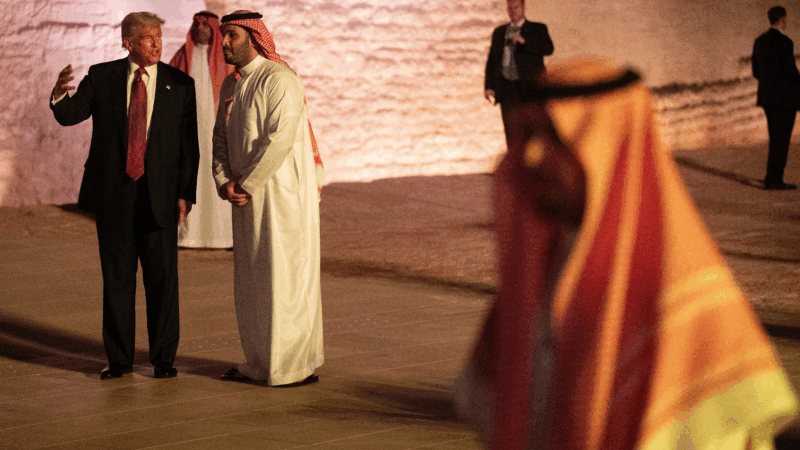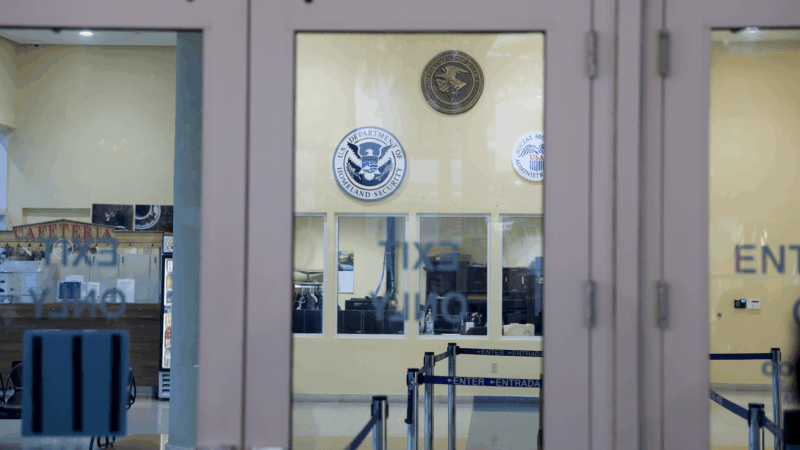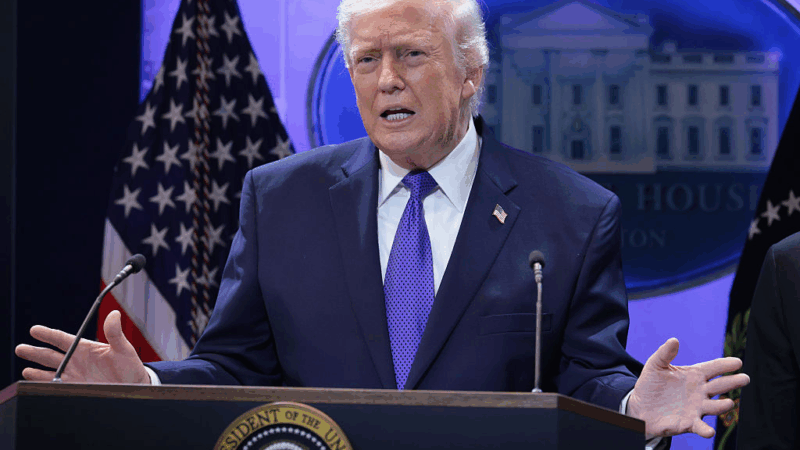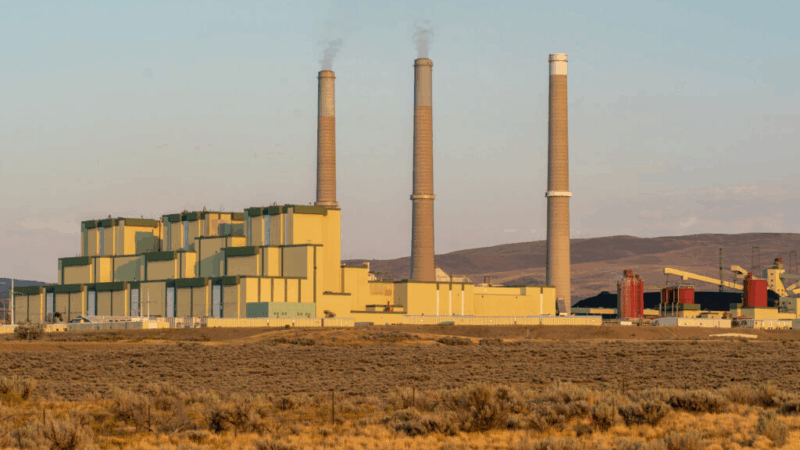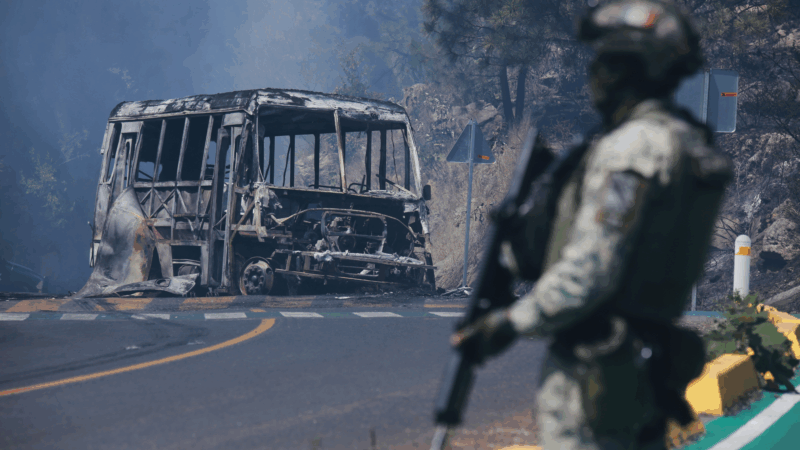Trump’s foreign policy: deals with allies over diplomacy with rivals
President Trump has been threatening to abandon peace efforts in the Russia-Ukraine war. And he isn’t saying much about the Israel-Hamas fighting either.
Yet Trump is quick to tout international economic agreements. On his recent Middle East trip, the president touted business deals and investments with the wealthy states of Saudi Arabia, Qatar and the United Arab Emirates and said the region is now being defined by “commerce, not chaos.”
“Where it exports technology, not terrorism. And where people of different nations, religions and creeds are building cities together, not bombing each other out of existence. We don’t want that,” Trump said.
In short, Trump shows a clear preference for the art of the deal over the art of diplomacy.
“Business deals are Trump’s comfort zone,” said Stephen Walt, a professor of international affairs at Harvard. “It certainly fits his self-image that he’s a master dealmaker and master negotiator.”
But Walt and other the foreign policy analysts stress an important point: you make deals with allies who have similar interests. You do diplomacy with rivals who have opposing interests.
“Where Trump is much less successful, much less comfortable, is when there’s a genuine conflict of interest,” said Walt. “When you’re trying to produce a lasting ceasefire in Gaza, when you’re trying to come up with an actual end to the war in Ukraine.”
Trump rarely, if ever, addresses the soaring civilian death toll and the humanitarian crisis among Palestinians in Gaza. When he does mention the territory, he usually talks about the possibility of the U.S. taking control and building luxury beachfront properties.

Skeptical of U.S. overreach
Steven Cook, at the Council on Foreign Relations, said successive U.S. presidents, Democratic and Republican, have tried to re-fashion the Middle East as a more peaceful, democratic region — and largely failed. Trump shows no interest in such lofty goals.
“The president essentially dispensed with the kind of overambition that has marked American foreign policy in the Middle East,” said Cook. Trump’s message is, “We are not interested in remaking societies. We are not promoting democracy.”
Trump’s agenda is limited and transactional. But Cook thinks this is more realistic and will likely keep the U.S. out of major entanglements. He sums up Trump’s approach this way: “These societies can develop and pursue their politics as they see fit without the intervention of the United States, which has been destabilizing over the course of the last 30 years.”
Cook does have concerns. The Mideast remains volatile. Trump is relying heavily on one envoy, Steve Witkoff, his friend from their days in New York real estate.
Witkoff had no diplomatic experience before joining the Trump administration this year. Now he’s handling nuclear negotiations with Iran, ceasefire efforts in the Gaza war and, for good measure, the Russia-Ukraine conflict.
Cook says Trump is overestimating what Witkoff can deliver.
Trump is “miscalculating when he thinks that a deal’s a deal, whether it’s about a luxury hotel or it’s about Iran’s nuclear program or it’s about a hostage deal and ceasefire, that these are all the same,” said Cook. “They’re going to run into problems because the president wants to go with his gut.”
So far, the exception to Trump’s general approach to the region is Iran, where Witkoff is trying to work out an agreement on Iran’s nuclear program. In his first term, Trump pulled out of a deal reached by President Obama. Trump says he can negotiate a much better arrangement, though he’s also threatening military action if there’s no deal.

Deals with Ukraine and Russia
In the Russia-Ukraine conflict, Trump also emphasizes dealmaking. He pressed for a minerals agreement with Ukraine — and it was recently signed.
Geoffrey Pyatt, a former U.S. ambassador to Ukraine, supports the agreement. He notes he worked on a similar effort when he was the ambassador in Kyiv from 2013 to 2016. But one business deal won’t end a war with a long, complicated history.
“This war has its origin in the agenda of one man, Vladimir Putin, and his sacrifice of hundreds of thousands of Russian soldiers who died in pursuit of his territorial ambitions,” Pyatt said.
Pyatt retired in January after 35 years at the State Department. He fears the U.S. is short-changing its own diplomatic clout, particularly with Russia.
European leaders are talking about ramping up sanctions on Russia, while Trump has been speculating about future trade deals with Moscow after the war ends.
“European leaders have clearly signaled that as long as Putin continues to ignore calls for a ceasefire they are prepared to raise the cost,” Pyatt said. “The Trump administration does not appear willing to do the same, at least up until now.”
In recent days, Trump has criticized intensive Russian air strikes against Ukrainian cities, he’s called Putin “crazy,” and is threatening more sanctions. But he hasn’t yet taken any action.
Trump has said repeatedly that if Russia and Ukraine don’t reach a ceasefire, he’s prepared to walk away from a conflict he once promised to resolve in a day.
Stephen Walt says Trump should be skeptical of U.S. adventures abroad. But there’s also risk in the U.S. abandoning hot spots where it could play an influential role.
“I fear that on all of these places where there’s a serious conflict of interests, something that’s hard to resolve, the United States is likely to be absent without leave,” said Walt.
Trump to raise global tariffs. And, most say the state of the union is weak, poll says
President Trump says he is raising global tariffs to 15%. And ahead of the president's address tomorrow, most Americans say the state of the union is not strong, according to an NPR poll.
U.S. has a quarter fewer immigration judges than it did a year ago. Here’s why
The continued drain of personnel from the already strained immigration court system has contributed to depleted staff morale, mounting case backlogs — and floundering due process.
Influencers are promoting peptides for better health. What’s the science say?
The latest wellness craze involves injecting these molecules for athletic performance, longevity and more. Scientists say the research isn't keeping pace with the health claims.
Poll: Most say the state of the union is not strong and the U.S. is worse off
Ahead of the State of the Union address on Tuesday, evidence continues to mount that President Trump is facing political headwinds.
The owners want to close this Colorado coal plant. The Trump administration says no
The Trump administration has ordered several coal plants to keep operating past their planned retirement, part of a larger effort to boost the coal industry. Two Colorado utilities are pushing back.
Mexico fears more violence after army kills leader of powerful Jalisco cartel
School was canceled in several Mexican states and local and foreign governments alike warned their citizens to stay inside following the army's killing of the leader of the Jalisco New Generation Cartel, Nemesio Rubén Oseguera Cervantes, "El Mencho," and the violence it spurred

